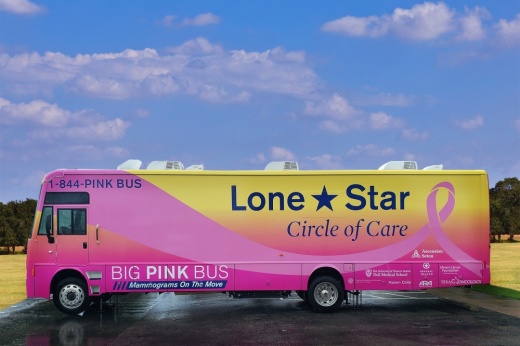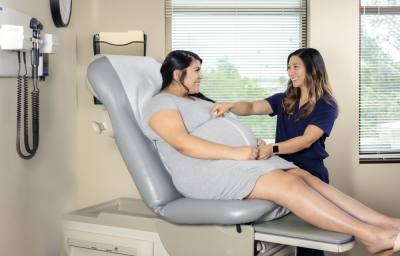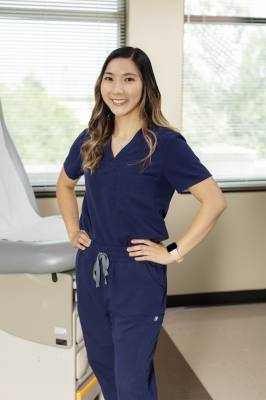“Pap smears and mammograms were not the first priority during COVID, so a lot of women have gotten behind in their preventative screenings or preventative health exams,” said Lone Star Circle of Care’s Dr. Angee Ong, OB/Gyn. “We at Lone Star are really, really encouraging women to make these appointments and get caught up.”
A San Antonio native, Dr. Ong studied women’s health at UT Austin, UT San Antonio and Tulane before landing at Lone Star Circle of Care. She was drawn to the Federally Qualified Health Center for its unwavering commitment to caring for all people, regardless of financial status.
“We’re able to work with a lot of populations that would not otherwise be able to get any type of care,” Dr. Ong said. “When they come see us at Lone Star, we don’t treat them any different than we would treat them at a private clinic.”
An expert in her field, Dr. Ong understands the difficulty of helping women nurture themselves and advocate for their own health. Oftentimes, women prioritize their spouses, children, friends and other family members before themselves.
“Being somebody who’s in women’s health, it’s great for us to be able to advocate for women, let them know that their health is important as well,” Dr. Ong said. “We’re able to make a difference in these women’s lives.”
It is recommended that women get their first well-woman exam and pap smear at age 21. At Lone Star, these exams begin with a medical assistant taking vital signs, family history, vaccine history, primary doctor information and any patient concerns like issues with contraception.
“We always reassure our patients that at the end of the day, they are in control. If they do not feel like mentally or emotionally ready to do a pelvic exam or pap smear that day, that is O.K.,” Dr. Ong said.
During a typical visit, the OB/Gyn conducts a head-to-toe assessment, including a heart and lungs exam, abdominal exam, breast exam and pelvic exam. These preventive measures allow OB/Gyns to catch anything out of the ordinary before it turns into something drastic or unmanageable.
“When we do our pelvic exams and we do our pap smears every year, if it comes back with abnormal cells, we can catch that before it becomes cervical cancer,” Dr. Ong said.
Younger women ages 21-30, need a pap smear every three years. After the age of 30, women are tested for HPV, a virus that has been strongly associated with cervical cancer. If the test is negative, tests are conducted every five years.
Because cervical cancer is asymptomatic, these visits are life-saving. Without well-woman exams, Dr. Ong said most women would not know they have cervical cancer, as pain and abnormal bleeding do not occur until it has progressed to a severe stage.
“We still recommend, even if you’ve had a pap smear that is up-to-date, that you still come back for your annual exam. That way, we can look and make sure there’s no awkward masses or anything that’s growing that is different,” Dr. Ong said.
Without a family history of breast cancer or genetic abnormalities, mammograms during well-woman exams start at age 40 and are recommended to reoccur every year. Well-woman exams are also opportunities to get caught up on colonoscopies, request labs and discuss any abnormal symptoms, such as extreme pain during the menstrual cycle.
“Women are very, very good at dealing with pain or feeling like they should deal with their periods, or if there’s anything concerning, just putting it off,” Dr. Ong said. “A lot of times, these can be symptoms of something that’s a little more dangerous or a little scarier.”
Lone Star Circle of Care also has options for uninsured patients to receive preventive care at a reasonable price. Since July 2021, Lone Star Circle of Care has provided nearly 2,700 mammogram screenings on its Big Pink Bus, a mobile facility offering free and low-cost mammography services in Travis, Williamson, Bastrop, Caldwell and Hays counties.
“[There are] these rural communities where they maybe don’t have imaging centers, or they’re very limited on where they can go due to their financial situation,” Dr. Ong said. “So, the Big Pink Bus allows people that are in these situations to be able to still get their screening without having to worry about financial burdens.”
Having traveled over 10,000 miles across Central Texas, 10 cancer diagnoses have resulted from patients screened on the bus, with 16% of patients requiring follow-up services like diagnostic mammograms and ultrasounds.
Lone Star Circle of Care qualifies eligible uninsured patients for safety net programs and a sliding fee scale is available according to household income and size, and privately-insured patients are welcome as well.
“With the overall mission of Lone Star, we are trying to serve the community and population as best as we can,” Dr. Ong said. “The Big Pink Bus, because it allows for access for these patients that they otherwise wouldn’t be able to, I think it fits right in line with what Lone Star is trying to do.”
How to use the Big Pink Bus:
- To be eligible, a patient must be 40 or older and not have had a mammogram in the last 12 months.
- Appointments are scheduled by calling 1-844-PINK-BUS or sending an email to [email protected].
- The bus visits different Lone Star Circle of Care locations day-by-day, so patients can choose the location and date most convenient for them.
- Patients will receive high quality breast imaging services performed by a registered Mammography Technologist using a Hologic 3-D system.
- ARA Diagnostic Imaging partners with Lone Star Circle of Care to read the images, provide results and serve patients needing diagnostic follow up.
The above story was produced by Community Impact's Storytelling team with information solely provided by the local business as part of their "sponsored content" purchase through our advertising team. Our integrity promise to our readers is to clearly identify all CI Storytelling posts so they are separate from the content decided upon, researched and written by our journalism department.








